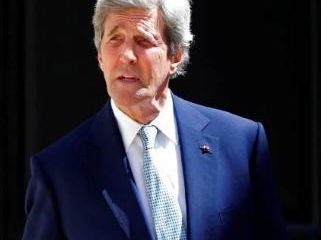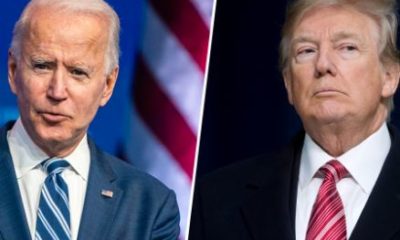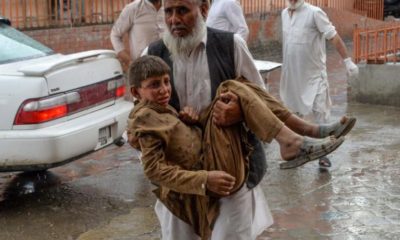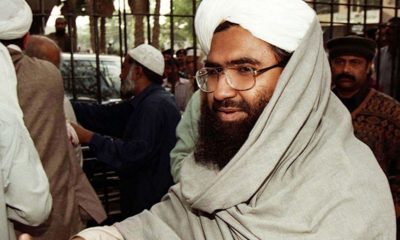World
Indian army colonel in UN peacekeeping operation injured in South Sudan

United Nations: As the UN peacekeeping operations in South Sudan struggles with inadequate resources and widening mandates, an Indian Army colonel was injured in crossfire between two warring groups there Thursday, according to sources monitoring the mission in New York.
They said the officer was injured in the region of the back of the neck, but not seriously, when a camp in Malakal was hit. Indian peacekeepers are are deployed there to protect several thousand refugees.
The Secretary General’s spokesperson, Stephane Dujarric, confirmed that a peacekeeper was injured but could not identify him or his nationality. “The UN Mission reports new firing outside of its compound in Malakal,” he said. “One peacekeeper was injured.”
India’s Permanent Representative Asoke Kumar Mukerji had warned the Security Council last week about the deteriorating situation there in two letters to its president, Raimonda Murmokaite that has seen.
On May 20, he wrote, “It is extremely important that the Security Council take urgent action to prevent any casualties and collateral damage with regard to the Indian troops and internally displaced people (IDPs)” or refugees.
The attack occurred hours before the Security Council voted to extend the UN Mission in South Sudan (UNMISS) till November end and authorised it “to use all necessary means” to protect civilians “irrespective of the source of such violence.”
On Friday, the UN observes the International Day of Peacekeepers.
Of the 2,000 Indian troops in UNMISS, more than 800 are based in Malakal, situated in South Sudan’s oil-rich Upper Nile state that is sandwiched between Sudan and Ethiopia. The region has been wracked by fighting between forces loyal to President Salva Kiir Mayardit and supporters of former vice president Riek Machar Teny of Sudan People’s Liberation Movement in Opposition (SPLM-IO).
The fighting escalated about a week ago when Major General Johnson Olony defected from the government side to Riek Machar’s, taking with him a large troop contigent. Kiir retaliated by moving reinforcements to the area.
Soon afterwards Mukerji wrote to Murmokaite, “The threat is both extremely grave and imminent” and asked for assurance that “every measure feasible will be taken to ensure that casualties and damage are avoided.”
His fears are underscored by the killing of seven Indian army personnel in two separate incidents in 2013 in South Sudan.
Diplomatic sources familiar with the situation in South Sudan said that the a political solution to the conflict was essential to bring peace to the area and the peacekeeping operation could not by itself achieve that. One of them paraphrased UN Secretary General Ban Ki-Moon’s quip, “You can’t keep peace if there is no peace” to emphasise the point.
Ban in a report to the Security Council last month conceded that there was a “lack of progress towards securing a peaceful settlement of the conflict.”
The sources faulted the Security Council, which does not adequately consult with troop-contributors, for not taking stronger measures to push the warring sides to a political settlement.
The peacemaking process has virtually been outsourced to a seven-nation East African organisation, Intergovernmental Authority on Development (IGAD), which has so far failed to broker an enforceable peace.
Earlier this month, IGAD admitted it was “deeply frustrated by the spread of violence to Upper Nile.”
Ban has also not given the South Sudan crisis the same level of attention as he has to others like Yemen.
Asked Thursday if the Ban plans to reinvigorate the peace process there, his spokesperson, Dujarric, deferred to IGAD, saying, “It’s something that IGAD continues to be in the lead. We are supportive of that process.”
Although the Security Council adopted the 4,600-word resolution backing the peacekeeping mission and emphasising its mission to protect civilians, the operations are hamstrung by lack of resources and logistical foresight, sources familiar with UNMISS operations said. This makes the peacekeepers vulnerable to attacks and the UN efforts there ineffective.
Recounting the conditions under which the Indian peacekeepers operate, a source who has seen the operations first hand, said that although the Security Council tells them “to use all necessary means,” they are virtual sitting ducks when they come under crossfire.
This is because they cannot retaliate as that would lead to direct attacks that could endanger the civilians they are protecting. “Best bet is to lie low and not do anything unless they are directly attacked,” the source said.
As a protection against mortar and heavy weapon fire, they need bunker-like defensive structure, which the UN and South Sudan government do not want built as that would appear to make the UN compounds sheltering the refugees permanent installations, the source said.
Due to lack of planning and logistics, most of the 5,000 personnel brought in during the troop surge authorised by the Security Council last year are still sitting in Juba, the country’s capital in the south instead of being deployed to areas needing them, the source said.
As result the peacekeepers in the conflict areas are stretched thin and pinned down guarding the refugees, rather than going out on confidence-building patrols. The patrols, undertaken on the ground or from the air, are an important element of the Security Council mandate because they also bring along staff from other UN agencies and non-governmental organisations (NGOs) for outreach activities.
Transportating troops, supplies and relief for refugees difficult because South Sudan has few roads. The Upper Nile state depends mostly on river transport and convoys require armed escorts, which are in short supply.
Bangladesh has contributed a riverine unit from its navy, but it is only now being deployed, the source said, and may vessels on dry docks.
More helicopters and aircraft suitable for operating there are needed.
Peacekeepers’ movements are also restricted by the South Sudan government, the source said. Often, when they are cleared by the government, they also have to coordinate with opposition forces to ensure they are not attacked, the source said. But they do come under sporadic attacks.
Mukerji pointed out to he Security Council president in a letter last Friday that a camp at Melut in Upper Nile state ran out of water and the Sudan Peoples Liberation Army was not allowing the peacekeepers to fetch water from the river.
National
Foodman Vishal Singh Honored for Hunger Free World Mission in Bangkok

Lucknow: Vishal Singh, a renowned social worker from Lucknow, also known as Foodman, has once again made India proud. He was honored by the Happy Hands Gloves Cooperative Limited Company in Korathai, Thailand, for his work with the Hunger Free World Mission.
The Hunger Free World Mission’s meeting was held in Korathai, Thailand, under Vishal Singh’s leadership. Representatives from several countries, including Mr. Raja Dwivedi (Managing Director of Happy Hands Gloves Limited), Thailand Coordinator Mr. Raja Mishra, and member Mr. Varun Singh, attended the event.

Under Vishal Singh’s leadership, the attendees took a pledge to work together toward creating a hunger-free world.
Speaking on the occasion, Vishal Singh explained that the main goal of the Hunger Free World Mission is social participation. He said the mission is not just about feeding people but also about meeting other basic needs of those who are struggling. The mission focuses on helping families of terminally ill patients in hospitals by providing food and shelter. It also works to fulfill essential needs like education, jobs, and care for the elderly.
For the last 16 years, the Vijay Sri Foundation has been providing free services, benefiting thousands of people. Vishal Singh highlighted that the mission aims to gain global recognition like other organizations such as WHO, WWF, and Red Cross, which work for social causes.
During this meeting, Vishal Singh was appointed as the Chairman of the Hunger Free World Mission by representatives from various countries. They also discussed holding regular meetings in different countries to push the mission forward.
Business tycoon Dr. Abhishek Verma has also supported this humanitarian mission, vowing to promote the idea of “Seva Parmo Dharma” (Service is the highest duty) worldwide. Vishal Singh praised him, stating that people like Dr .Abhishek Verma inspire others to work for the betterment of society.
Recently, Romania’s Ambassador, Mr . Daniela Sezonov Ţane, invited Vishal Singh to the Romanian Embassy in Delhi, where they discussed the mission in detail. Impressed by his humanitarian work, she honored Vishal Singh and invited him to Romania to take the mission forward .
Food man Vishal Singh has been serving the people of India for the past 16 years. Through the Vijay Sri Foundation, he provides free meals to cancer patients & their families ,shelter, and education for women & children along with running free old-age homes in Lucknow.
In addition to his humanitarian work, Vishal Singh also addresses issues like crime and corruption through his role as Chairman of Seva Path Media and Managing Director of Vijay Sri Foundation.

During the COVID-19 pandemic, Vishal Singh and his team worked tirelessly to provide food and help to the needy, including starving children, elderly citizens, and pregnant women. Despite contracting the virus himself, he continued to assist others after his recovery. He even created a life-saving oxygen regulator using household items, which was praised by doctors both in India and abroad.
In his address at the meeting, Vishal Singh spoke about his mission to create a hunger-free world. He pointed out that India’s large population, along with issues like unemployment and poverty, has caused the country to fall on the Hunger Index. He urged people to contribute just one handful of grains daily to help create a hunger-free world.
He concluded by saying that through social participation, we can empower the people around us, meet their basic needs, and work together to build a stronger, more prosperous, and developed society.























